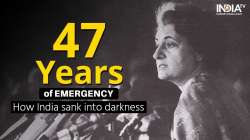Emergency in India: Muzzling free speech, jail & bans | How India sank into darkness 47 years back
The order vested upon the Prime Minister the authority to rule by decree, allowing elections to be suspended and Freedom of Press was curtailed.

Emergency in India: Last year in 2021, Congress leader Rahul Gandhi finally conceded that the Emergency imposed by former prime minister Indira Gandhi was a "mistake". The Congress leader added what happened during that period was "wrong".
On this day, Independent India experienced the darkest hour of its history. This day in 1975, an emergency was declared in India, for a 21-month period by the then Prime Minister Indira Gandhi.
What happened that day?
Officially issued by President Fakhruddin Ali Ahmed under Article 352 of the Constitution due to the prevailing "internal disturbance", the Emergency was in effect from June 25, 1975, until its withdrawal on March 21, 1977. The final decision to impose an Emergency was proposed by Indira Gandhi, agreed upon by the President, and thereafter ratified by the Cabinet and the Parliament (from July to August 1975), based on the rationale that there were imminent internal and external threats to the Indian state.
Emergency Excesses
The order vested upon the Prime Minister the authority to rule by decree, allowing elections to be suspended and Freedom of Press was curtailed. Several human rights violations were reported in that time, including a forced mass-sterlisation campaign spearheaded by Indira's son Sanjay Gandhi.
Also Read | Emergency was a mistake: Rahul Gandhi
Months preceding the Emergency
In March–April 1974, a student agitation by the Bihar Chatra Sangharsh Samiti received the support of Gandhian socialist Jayaprakash Narayan, referred to as JP, against the Bihar government. In April 1974, in Patna, JP called for "total revolution," asking students, peasants, and labour unions to non-violently transform Indian society.
Election fraud case against Indira Gandhi
Raj Narain, who had been defeated in the 1971 parliamentary election by Indira Gandhi, lodged cases of election fraud and use of state machinery for election purposes against her in the Allahabad High Court. Shanti Bhushan fought the case for Narain. Indira Gandhi was also cross-examined in the High Court which was the first such instance for an Indian Prime Minister. On 12 June 1975, Justice Jagmohanlal Sinha of the Allahabad High Court found the prime minister guilty on the charge of misuse of government machinery for her election campaign. The court declared her election null and void and unseated her from her seat in the Lok Sabha. The court also banned her from contesting any election for an additional six years. Serious charges such as bribing voters and election malpractices were dropped and former PM was held responsible for misusing government machinery.
Indira Gandhi challenged the High Court's decision in the Supreme Court. Justice V. R. Krishna Iyer, on 24 June 1975, upheld the High Court judgement and ordered all privileges Gandhi received as an MP be stopped, and that she be debarred from voting. However, she was allowed to continue as Prime Minister pending the resolution of her appeal. Later, President Fakhruddin Ali Ahmed declared a state of internal emergency upon the prime minister's advice on the night of 25 June 1975, just a few minutes before the clock struck midnight.
Grand old party hits all-time low in elections
On 18 January 1977, Gandhi called fresh elections for March and released all political prisoners, though the Emergency officially ended on 23 March 1977. The Congress was handed a crushing defeat, its first ever since the country's Independence in 1947, by the combined opposition of Janata Party.
(With Inputs from Agencies)
Also Read | 'Dark days of Emergency can never be forgotten': PM Modi reminds Congress its sins